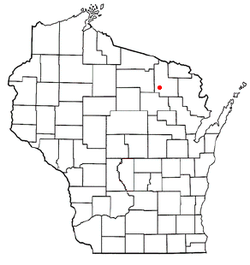Crandon, Wisconsin
| Crandon, Wisconsin | |
|---|---|
| City | |

Looking north at downtown Crandon
|
|
 |
|
| Coordinates: 45°34′11″N 88°54′04″W / 45.569845°N 88.901240°WCoordinates: 45°34′11″N 88°54′04″W / 45.569845°N 88.901240°W | |
| Country | United States |
| State | Wisconsin |
| County | Forest |
| Founded | 19th century |
| Established | 1887 |
| Incorporated | 1909 |
| Government | |
| • Mayor | Dennis Rosa |
| Area | |
| • Total | 1.37 sq mi (3.55 km2) |
| • Land | 1.36 sq mi (3.52 km2) |
| • Water | 0.01 sq mi (0.03 km2) |
| Population (2010) | |
| • Total | 1,386 |
| • Estimate (2012) | 1,915 |
| • Density | 1,019.1/sq mi (393.5/km2) |
| Time zone | Central (CST) (UTC-6) |
| • Summer (DST) | CDT (UTC-5) |
| ZIP code | 54520 |
| Area code | 715 & 534 |
Crandon is a city in Forest County, Wisconsin, United States; it is in the northeastern part of the state, about 100 miles (160 km) north of Green Bay. The population was 1,920 at the 2010 census. It is the county seat of Forest County and is the only incorporated community in the county. The city is located adjacent to the Town of Crandon.
Samuel Shaw, an entrepreneur and capitalist, bought property in the area of Forest County in the 1880s, formerly Oconto County. With the aide of Major Frank P. Crandon, tax commissioner with the Chicago and North Western Transportation Company, he successfully lobbied the Wisconsin Legislature for the creation of Forest County, which was established in 1887. Because of his help, Frank Crandon became the namesake for the county seat. Rail service arrived shortly thereafter in the region via the Soo Line Railroad, but a spur line did not directly reach the town until the turn of the 20th century.
The lumber industry defined the early growth of the city. In 1891, Page and Landeck Lumber Company purchased a tract of hardwood timberlands near Crandon, and by 1902, the company built a huge sawmill (later named the Keith & Hiles Lumber Mill) near Clear Lake on Crandon's north side. The population of Crandon grew from 800 to more than 2,400 in just a few years. With the rail line's presence, settlers and loggers from Kentucky were recruited for the bustling timber industry of northern Wisconsin. The company's sawmill eventually was moved to Crandon from Glasgow, Kentucky. Modern culture lore reflects the early "Kentuck" ancestors. The city was officially incorporated as Crandon in 1909 after construction of the county courthouse began, and much of the town's building stock was constructed during this time. Though timber has diminished as a prominent industry in the north-central United States, logging companies still operate in the nearby Nicolet National Forest.
...
Wikipedia
